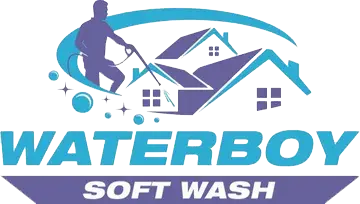Understanding Exterior Wall Cleaning Methods
The most common method used for cleaning hard surfaces today is power washing, which is frequently employed on outdoor walls made of stone or brick. In Downingtown, Pennsylvania, where buildings often feature traditional masonry and natural stone elements, exterior cleaning plays a vital role in maintaining property and enhancing visual appeal. Stone and brick walls tend to accumulate dirt, mold, mildew, algae, and other organic growth over time, particularly due to the region’s seasonal weather conditions.
Cleaning these surfaces may seem like a simple task, but selecting the right method is crucial to prevent damage. While power washing is effective, it may not always be the safest solution—especially when working with older or more fragile surfaces. Understanding how power washing works and when it should be used, or when it should not, helps property owners make informed decisions that protect both the appearance and integrity of their structures.
What Is Power Washing?
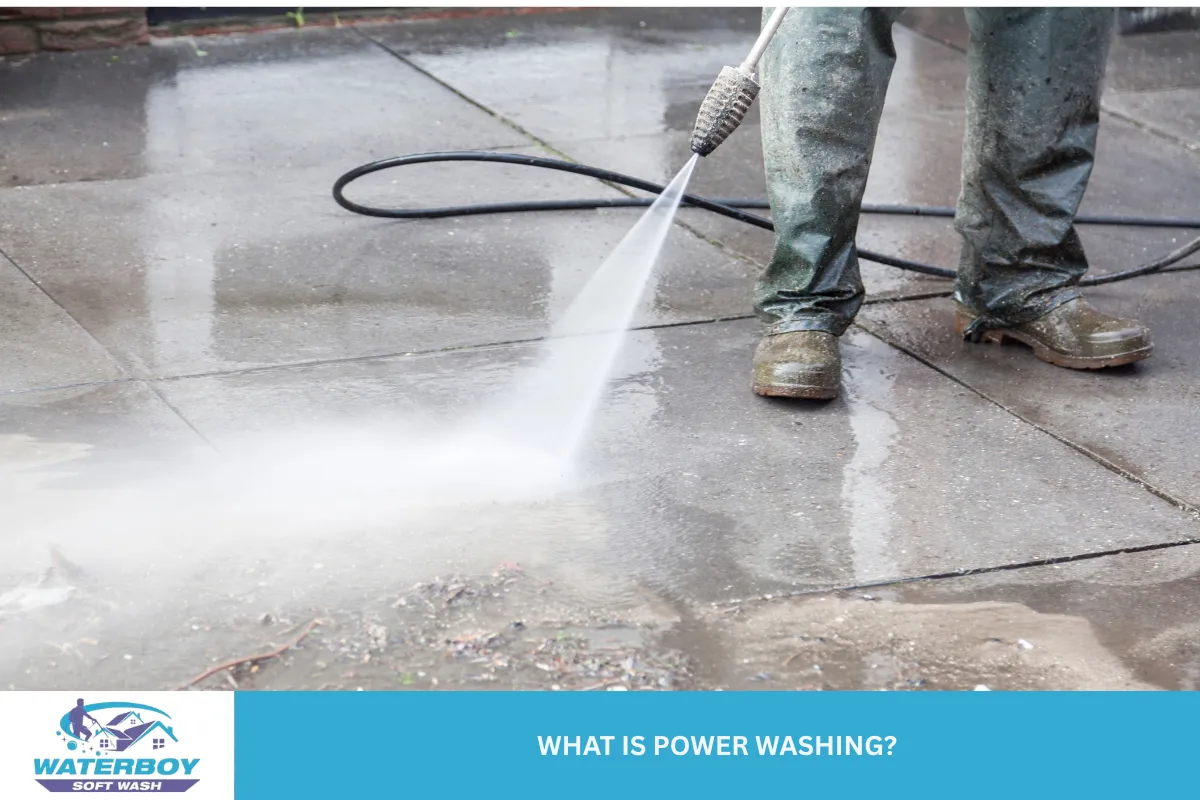
Power washing is a cleaning process that uses a high-pressure stream of water to remove dirt, mold, mildew, and other debris from surfaces. It involves the use of a motorized machine that pumps water at pressures ranging from 1,300 to over 3,000 pounds per square inch (PSI), depending on the equipment. The goal is to forcefully break down and wash away buildup without the use of scrubbing or harsh chemicals.
This method is often used for concrete, driveways, walkways, decks, fences, and some types of siding. On more durable materials, high water pressure can effectively strip away years of accumulated grime in just minutes. Power washing is usually performed with cold water, although some machines can use heated water for additional cleaning power.
Despite its effectiveness, high-pressure water can cause wear and damage if not used correctly. Materials such as painted wood, soft brick, mortar, and certain types of natural stone may deteriorate when exposed to intense forces. This is why it’s essential to evaluate the surface condition before proceeding with power washing.
Understanding Outdoor Stone and Brick Walls
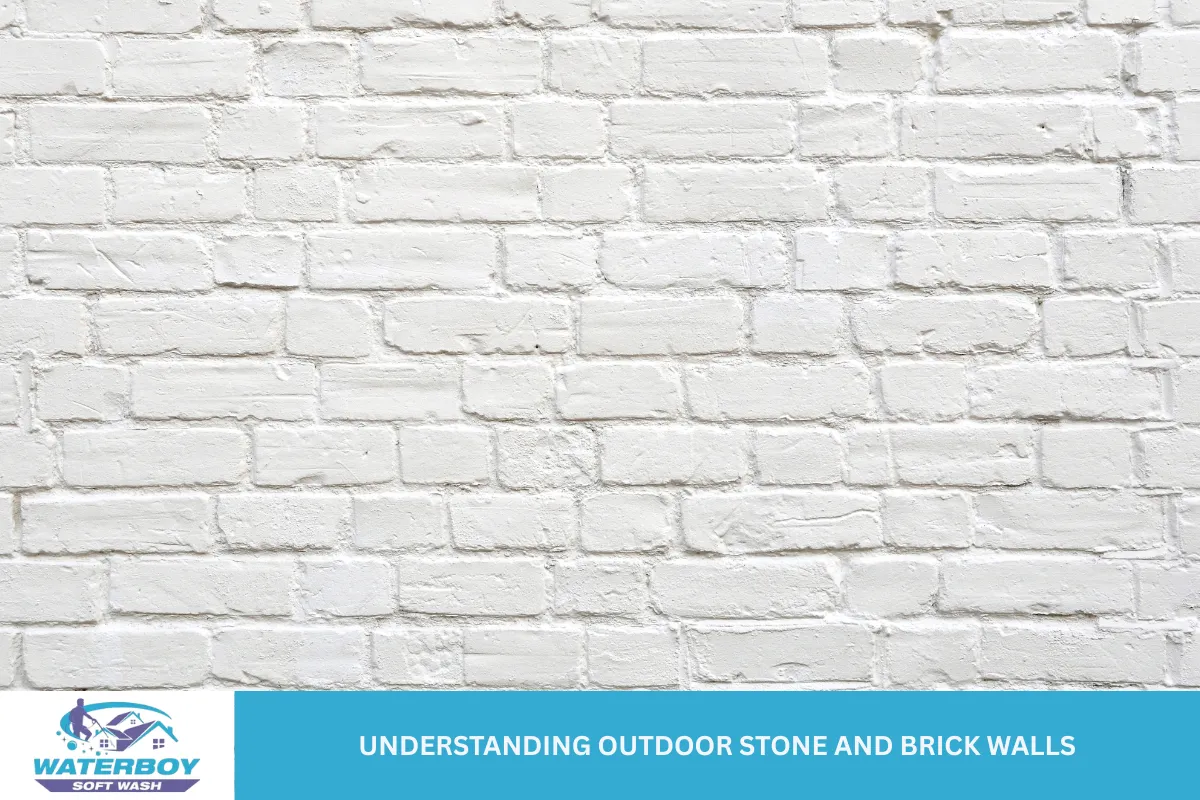
Outdoor stone and brick walls are popular for their durability and aesthetic value. In Downingtown, homes and buildings frequently feature natural fieldstone, limestone, flagstone, red clay brick, or even reclaimed historical bricks. Each of these materials reacts differently to changes in moisture, temperature, and pressure.
Stone walls are often made of sedimentary rock, which is porous and prone to erosion. Over time, the minerals within the stone can break down when exposed to moisture or harsh cleaning techniques. Similarly, brick walls—especially those made of older or hand-formed bricks—can be softer than they appear. The mortar between bricks is typically more vulnerable than the bricks themselves, and it’s often the first point of failure when subjected to high pressure.
Because of these structural details, care must be taken when cleaning masonry surfaces. Even small cracks or weak mortar joints can quickly worsen if exposed to the wrong type of cleaning force. Evaluating the condition of the wall and understanding its composition are essential steps before attempting any power washing.
How Power Washing Affects Masonry Surfaces
Using power washing on masonry surfaces, particularly stone and brick, can have several effects—some helpful and others harmful. The main benefit is the rapid removal of buildup. Algae, moss, mildew, and stains are quickly eliminated, which improves appearance and can reduce deterioration caused by trapped moisture or plant growth.
However, power washing can also compromise the structural integrity of these surfaces. High-pressure water can:
- Chip away at the mortar between bricks or stones
- Open up small cracks that allow water infiltration
- Cause surface etching or pitting, especially in softer materials
- Dislodge loose bricks or stone pieces
- Introduce moisture deep into the wall, which may freeze and expand during the winter months
These problems are not always visible immediately. Some damage may not appear for months, especially if water seeps into the structure and weakens it from within. For this reason, power washing must be approached with caution when dealing with any form of masonry.
Signs That a Surface May Not Be Suitable for Power Washing
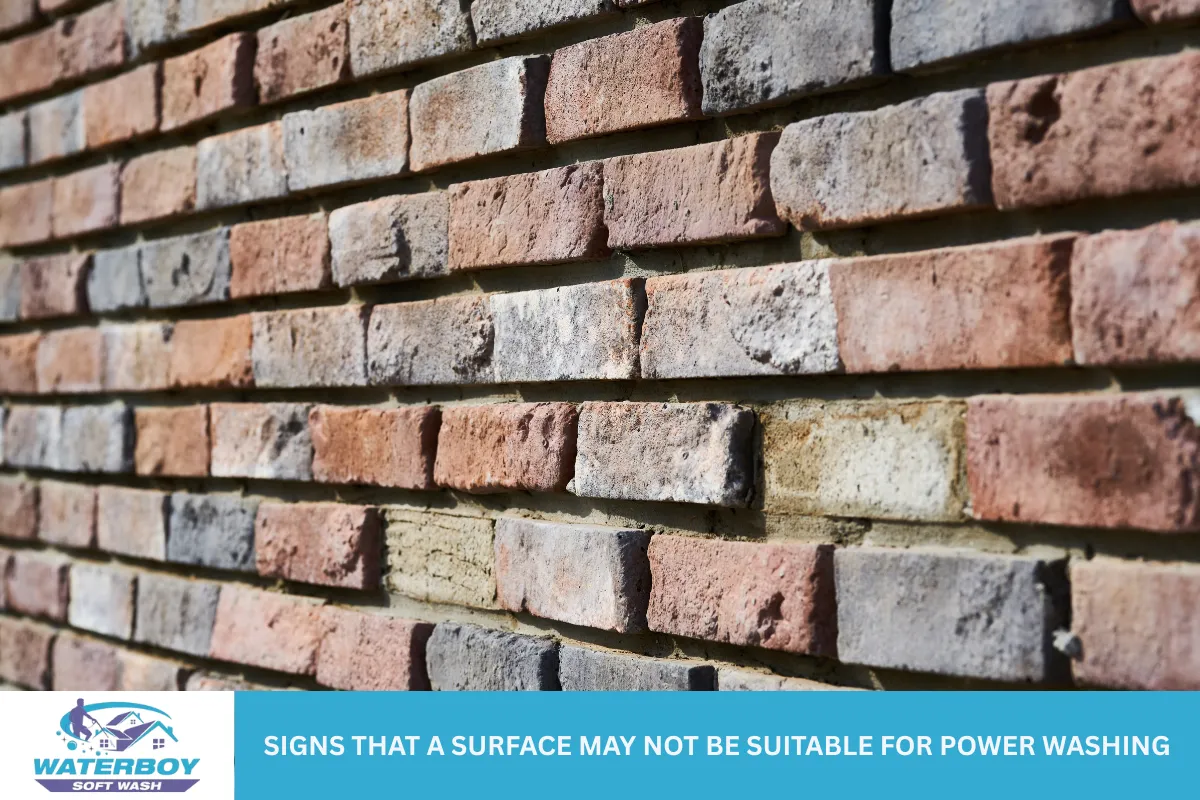
Certain conditions suggest that a surface may not be ideal for power washing. These include:
- Visible cracks in the mortar or surface material
- Flaking, crumbling, or chalky textures
- Loose stones or bricks
- Discoloration caused by water damage
- Walls over 40–50 years old with original materials
In such cases, power washing can exacerbate existing issues. A less aggressive approach, such as soft washing or manual cleaning, may be more appropriate.
It’s also important to avoid power washing during extreme weather conditions. Cleaning during cold months risks freezing water inside the wall, while cleaning during extreme heat can cause rapid drying and surface cracking.
Weather Impacts in Downingtown, Pennsylvania
Downingtown’s climate includes hot summers, wet springs, and cold winters. These weather patterns impact the growth of organic matter on exterior surfaces and influence the aging of stone and brick walls. Rainfall and humidity encourage the growth of mold and algae, while freezing temperatures in winter can cause expanding water to crack or split stone and mortar.
Because of this, scheduling any exterior cleaning—especially power washing—requires careful consideration of the weather. Late spring and early fall are often the best times, as temperatures are moderate and the weather is more predictable. Cleaning during these periods also allows surfaces to dry fully without risk of freezing.
How to Power Wash Masonry Safely
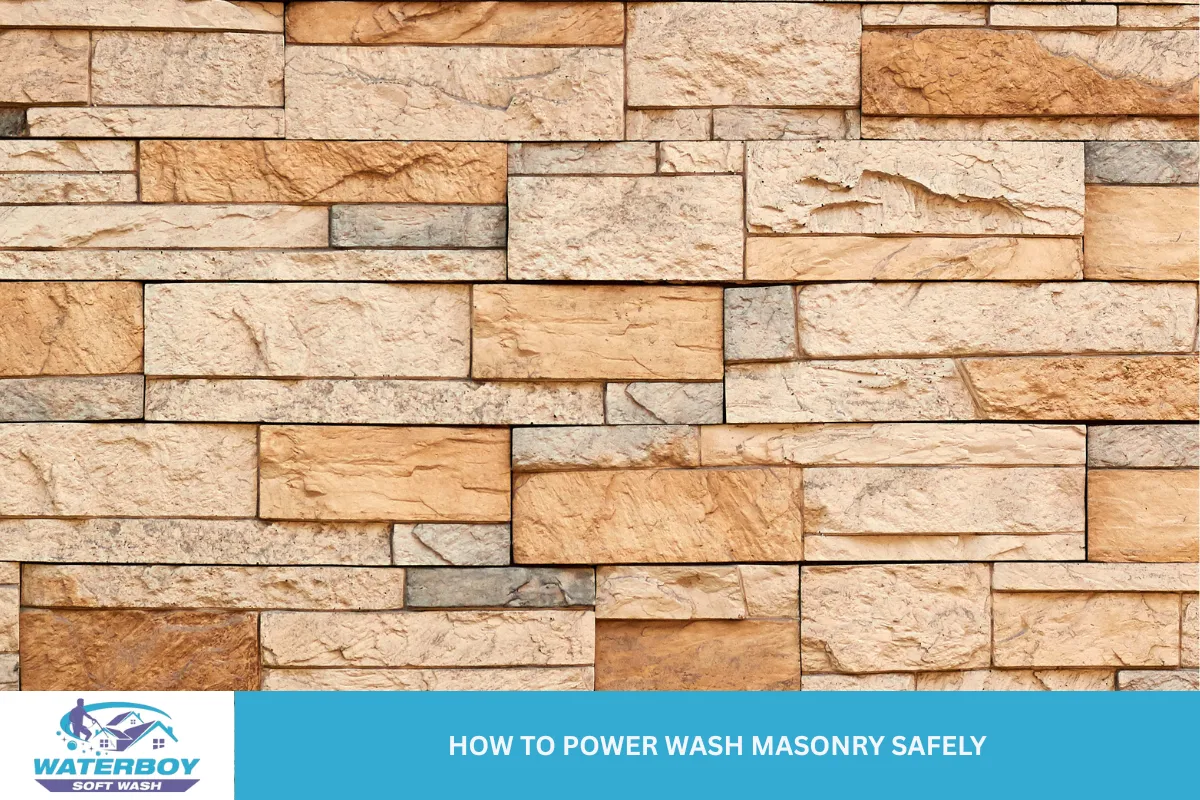
If power washing is determined to be appropriate for a surface, several precautions must be taken to reduce risk:
- Use a lower PSI setting (under 1,500 for most brick and stone)
- Select a wide-angle spray tip to distribute pressure evenly
- Maintain at least 12–18 inches of distance between the nozzle and the wall
- Spray at a downward angle to avoid pushing water behind surfaces
- Pre-wet the wall to minimize water absorption
- Test a small area first to observe the surface’s response
These steps are especially important for homeowners in Downingtown, where brick and stone materials may be older or more porous than in newer developments.
Cleaning Alternatives to Power Washing
For masonry surfaces that are too delicate or risky for power washing, there are several safe alternatives:
- Soft washing: Uses low-pressure water combined with cleaning solutions to loosen and remove dirt, algae, and mildew. It’s gentle on surfaces and less likely to cause damage.
- Manual scrubbing involves using brushes and biodegradable cleaners for spot cleaning. It’s time-consuming but highly controlled.
- Steam cleaning: Utilizes heated water vapor at low pressure to clean and sanitize surfaces. Effective for mold and mildew without abrasive force.
Choosing the right method depends on the condition of the surface and the type of material. For historic or older homes in Downingtown, non-pressure methods are often the safest and most effective approach.
Preventive Care for Stone and Brick Walls
Regular maintenance helps reduce the need for aggressive cleaning. Here are some tips for keeping stone and brick walls in good condition:
- Inspect for cracks or loose joints every few months
- Trim vegetation near walls to reduce moisture buildup
- Clean gutters and downspouts to prevent overflow that stains walls
- Use a breathable masonry sealant every few years to block moisture
- Keep irrigation systems pointed away from walls to reduce dampness
Preventive care preserves the structural integrity of your walls and minimizes the need for harsh cleaning techniques in the future.
Professional Power Washing vs. DIY in Downingtown
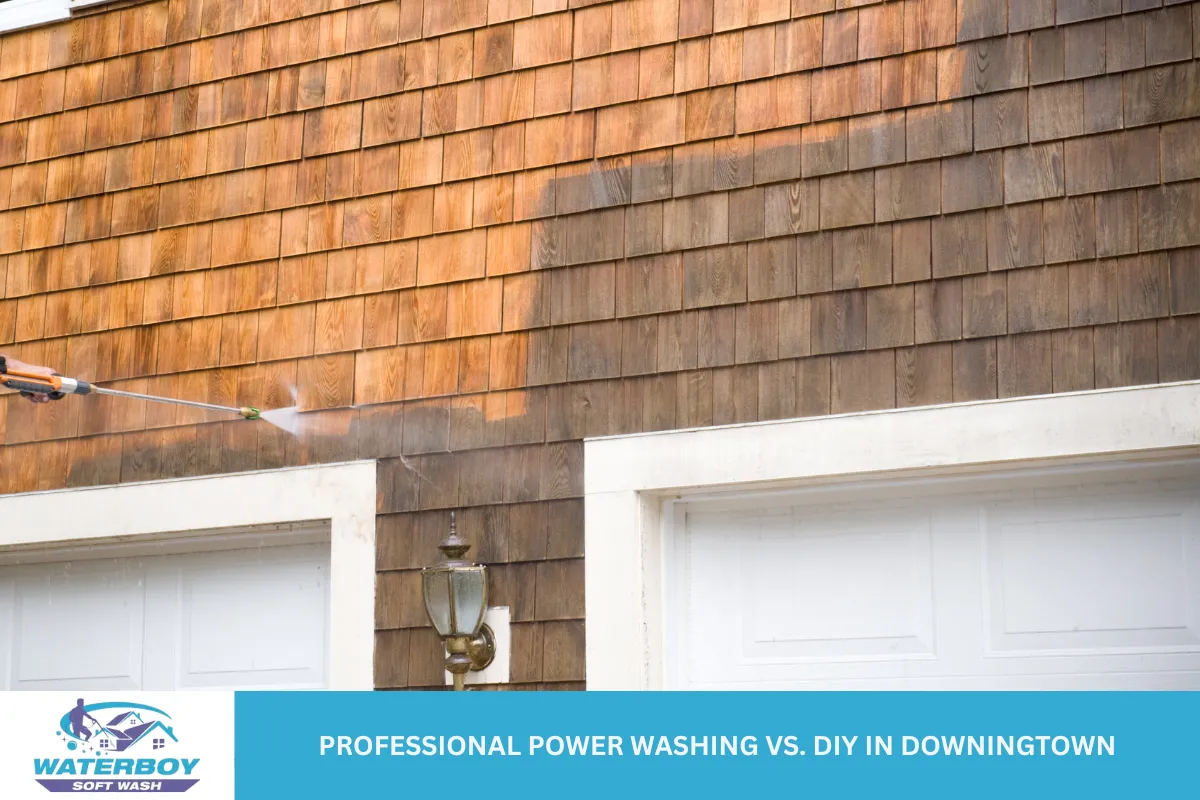
Choosing between hiring a professional and doing the work yourself depends on several factors. Professionals typically have experience assessing surfaces, choosing the correct pressure levels, and using specialized equipment that adjusts pressure safely. They are also more likely to be insured, which provides additional protection in the event of damage.
Doing the work yourself may seem more cost-effective, but it carries risks. Without the right tools and knowledge, it’s easy to cause lasting damage to masonry surfaces. Power washing equipment available for rent is often too powerful for delicate materials unless properly adjusted.
For homeowners in Downingtown who are unsure about the condition of their stone or brick walls, professional cleaning is the safer choice.
Long-Term Impact of Power Washing on Masonry
Over time, repeated power washing can wear down masonry surfaces. This is especially true for older bricks and natural stone, which may not be sealed or hardened against high water pressure. While the surface may appear clean immediately after washing, internal damage can accumulate with every subsequent cleaning cycle.
To extend the life of masonry surfaces:
- Limit power washing to once every few years
- Choose soft washing when possible
- Reseal surfaces regularly to protect against moisture
- Address small repairs promptly to avoid larger damage
Being cautious with cleaning frequency and technique helps preserve the appearance and function of exterior walls.
Is Power Washing Safe for Stone or Brick Walls?
Power washing can be a safe and effective cleaning method for outdoor stone and brick walls in Downingtown, provided it is done correctly and under the right conditions. The surface material, wall condition, and age of the structure all play critical roles in determining safety. Without proper care, power washing can lead to damage that compromises both appearance and structural integrity.
Alternatives, such as soft washing and manual cleaning, are often better suited for older or more fragile materials. Preventive maintenance, proper timing, and professional assessment are essential parts of a long-term care plan. Understanding the materials and making informed cleaning choices will help homeowners protect their investment while keeping their property looking clean, well-maintained, and attractive.
Downingtown Power Washing – Water Boy Soft Wash
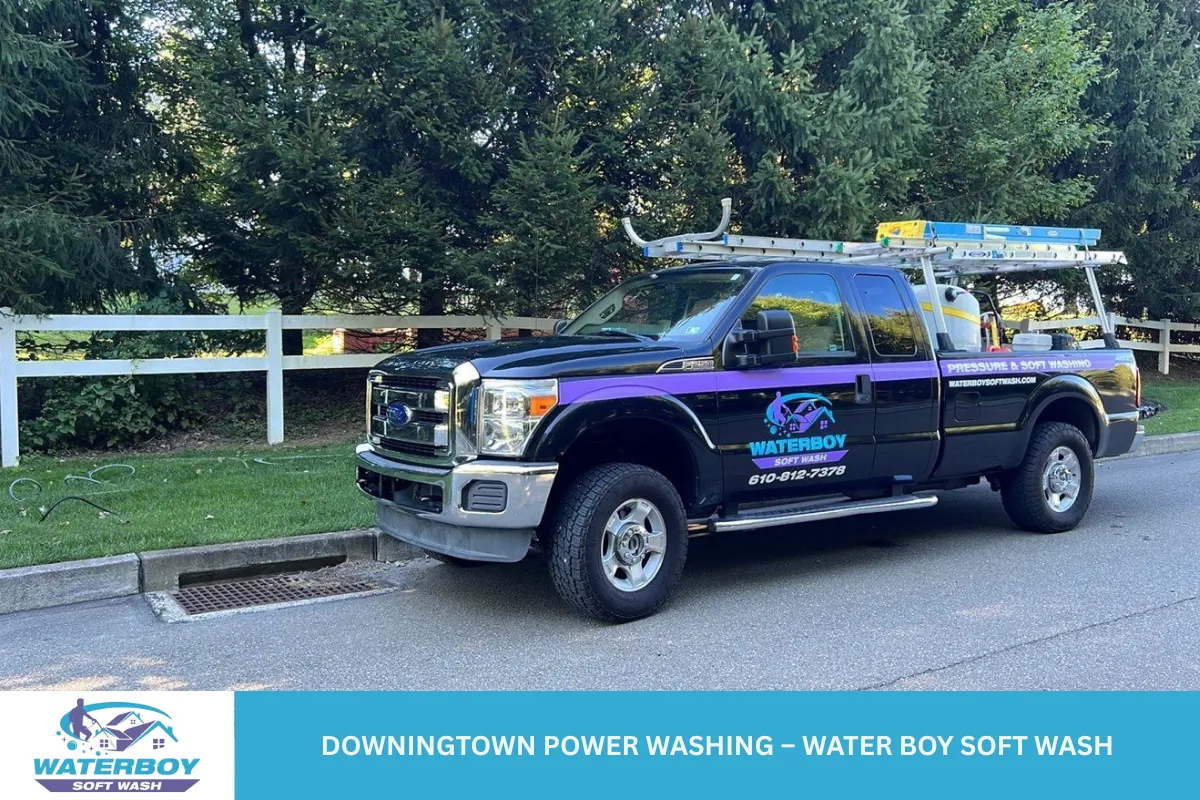
Looking for a reliable and safe way to clean the exterior of your home? Water Boy Soft Wash offers power washing in Downingtown that’s tailored to protect and refresh your stone, brick, and other outdoor surfaces. Our cleaning methods are carefully designed to remove mold, algae, and dirt without harming your property.
We specialize in soft washing, roof and house washing, gutter cleaning, window cleaning, and expert deck staining. Our team uses eco-friendly products and low-pressure systems to restore surfaces to their best condition safely. For effective and professional power washing Downingtown residents trust, give us a call today at (610) 812-7378. Let us help you care for your home—safely, thoroughly, and with lasting results.
Frequently Asked Questions About Power Washing Stone and Brick Walls
1. Can power washing damage brick or stone surfaces?
Yes, power washing can damage brick or stone if done incorrectly. High-pressure water can erode mortar joints, crack soft bricks, and even etch or pit the surface of natural stone. These materials are often porous, which means water can seep in, freeze during colder months, and expand—leading to long-term structural damage. Older homes in Downingtown are particularly vulnerable due to the aging materials and historical construction methods used. The safest approach involves using lower water pressure (typically under 1,500 PSI), a wide spray nozzle, and keeping the water stream at a downward angle. Pre-soaking the surface and working in small sections can also minimize damage. Hiring a professional familiar with masonry cleaning is often the best way to protect your property. The National Center for Preservation Technology recommends avoiding high-pressure cleaning for historic masonry and opting for gentler alternatives where necessary.
2. What is the difference between power washing and soft washing?
The main difference is the pressure. Power washing uses high-pressure water—usually between 1,300 and 3,000 PSI—to blast away dirt, grime, and algae. It’s effective for hard, durable surfaces, such as concrete and certain types of siding. Soft washing, on the other hand, utilizes low-pressure water (under 500 PSI) in combination with specialized cleaning solutions. It’s specifically designed for more delicate surfaces, such as older brick, natural stone, and painted exteriors. In Downingtown, soft washing is often a safer option for cleaning masonry, especially on older buildings or homes with decorative stonework. It effectively removes organic growth, such as algae, mildew, and moss, without causing surface damage. According to the American Society for Testing and Materials (ASTM), soft washing methods are preferred for porous materials because they reduce the risk of moisture intrusion and surface wear. Choosing between the two depends entirely on the surface condition and the type of material being cleaned.
3. How often should I power wash my exterior stone or brick walls?
Generally, stone or brick walls should not be power-washed more than once every two to three years, depending on environmental factors. Overwashing can wear down the surface and degrade mortar joints, especially in older or more porous materials. In Downingtown, where moisture levels can be high and seasonal temperature shifts are common, walls are more susceptible to mold, mildew, and algae buildup. However, frequent washing isn’t always the solution. Instead, it’s more effective to apply a masonry sealer after washing, which helps prevent future staining and biological growth. Performing annual inspections and gentle cleanings with a soft brush or low-pressure rinse in between power washes can extend the life of your masonry. The International Masonry Institute advises that proper maintenance—not aggressive cleaning—is the best strategy for preserving exterior masonry. Overuse of power washing can actually shorten the lifespan of your stone or brick walls.
4. What PSI is safe for cleaning brick or stone walls?
For most brick and stone walls, the recommended safe pressure setting is between 500 and 1,200 PSI. Anything above 1,500 PSI risks damaging the surface, especially if the wall is older or has weakened mortar joints. Soft red bricks, hand-formed bricks, limestone, and sandstone are particularly vulnerable and may require even lower settings. When pressure is too high, it can dislodge mortar, chip surface layers, and push water deep into the wall—leading to moisture retention, mold growth, or freeze-thaw damage in colder seasons. Downingtown homes, many of which feature historic or semi-historic architecture, often require extra caution when cleaning exterior walls. According to the Brick Industry Association (BIA), gentle cleaning methods with proper PSI settings are essential to prevent long-term damage. Using a wide-angle nozzle, maintaining proper distance, and always testing a small area first are key steps to safe power washing.
5. Is it necessary to seal brick or stone after power washing?
Yes, sealing is highly recommended after power washing, especially for porous materials like brick, limestone, and sandstone. Power washing removes surface grime but also opens up the pores of the material, making it more susceptible to moisture intrusion and staining. Applying a breathable masonry sealer helps protect against water damage, mold, mildew, and even freeze-thaw cracking during Pennsylvania winters. Sealing also keeps the surface looking clean for longer by preventing dirt and algae from settling in. In Downingtown, where humidity and rain are common, sealing adds an extra layer of protection that can extend the life of your exterior walls. The sealant should be vapor-permeable, meaning it allows trapped moisture to escape while blocking water from entering. This is especially important for older homes. According to guidelines from the National Park Service on historic preservation, breathable sealers are preferred to prevent the trapping of moisture within masonry surfaces.
Read more: Professional vs. DIY Exterior Cleaning in Downingtown, Pennsylvania: Which Works Best? h
